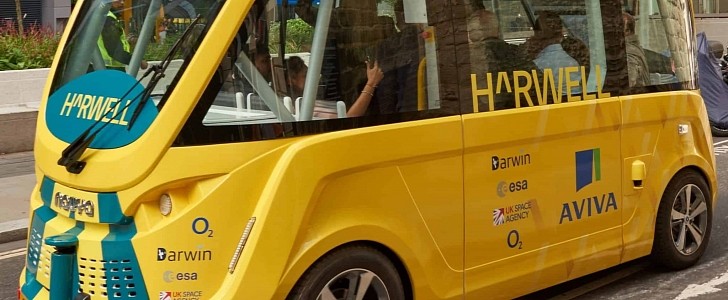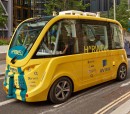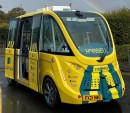What do autonomous driving technologies have in common with the European Space Agency (ESA) and the UK Space Agency? The answer is satellite communication. If the future of transportation is about green vehicles that are also self-driving and connected, then space technology also plays an important role.
With support from ESA and the UK Space Agency, the Darwin Innovation Group is trialing an autonomous passenger shuttle service in Oxfordshire. What’s special about this shuttle is that, unlike most vehicles of its kind, that rely on terrestrial Wi-Fi, it will use satellite communications, enabled by 5G networks.
The main benefit of this feature is that it allows autonomous vehicles to operate even in remote or rural areas, where there is little to no terrestrial coverage. This, in turn, will help expand autonomous transportation throughout the country.
The shuttle, developed by Navya, will be equipped with cameras, LiDAR sensors, and ultrasound sensors, as well as a satellite antenna. The Darwin Innovation Center will monitor its operations, with the help of the data sent by the vehicle in real time, using the channels provided by satellite operator Hispasat, and the 4G and 5G networks of mobile operator O2. O2 is not only providing the networks, but has also created the app for real-time tracking.
The shuttle is also battery-powered, which makes it not just self-driving, but green, too. It will operate at the Harwell Science Campus, during weekdays, and the service will be free of charge, open to all campus pass-holders. A safety operator will be on board at all times, monitoring the shuttle’s safety controls (it doesn’t have a steering wheel).
Satellite communications and 5G networks could play a significant part in expanding autonomous transportation. UK’s Science Minister, George Freeman, acknowledged these technologies' impact on keeping self-driving vehicles connected. This is another area where the country’s booming space technology is showing its benefits.
The main benefit of this feature is that it allows autonomous vehicles to operate even in remote or rural areas, where there is little to no terrestrial coverage. This, in turn, will help expand autonomous transportation throughout the country.
The shuttle, developed by Navya, will be equipped with cameras, LiDAR sensors, and ultrasound sensors, as well as a satellite antenna. The Darwin Innovation Center will monitor its operations, with the help of the data sent by the vehicle in real time, using the channels provided by satellite operator Hispasat, and the 4G and 5G networks of mobile operator O2. O2 is not only providing the networks, but has also created the app for real-time tracking.
The shuttle is also battery-powered, which makes it not just self-driving, but green, too. It will operate at the Harwell Science Campus, during weekdays, and the service will be free of charge, open to all campus pass-holders. A safety operator will be on board at all times, monitoring the shuttle’s safety controls (it doesn’t have a steering wheel).
Satellite communications and 5G networks could play a significant part in expanding autonomous transportation. UK’s Science Minister, George Freeman, acknowledged these technologies' impact on keeping self-driving vehicles connected. This is another area where the country’s booming space technology is showing its benefits.







